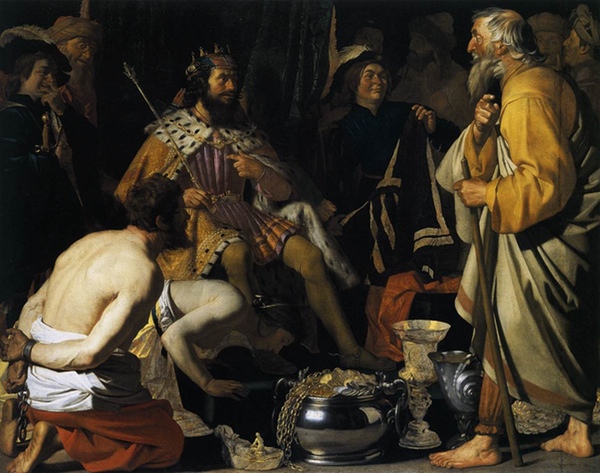
?? ?????? ???? ?????????? ????? ???? ?? ??????, ?? ??????? ??????? ?? ?????? ??? ?? ?? ????????? ???? ????????? ?? ??????? ??????????????, ???? ??????? ???? ?? ?????? ??? ?????????? ????????? ???????????, ?????????????? ??? ???????, ?????? ? ?????????? ????????? ?? ??? ??????????.
[A] man should not be insensible or indifferent to the common weal, arranging his private affairs securely and glorying in the fact that he has no share in the distempers and distresses of his country, but should rather espouse promptly the better and more righteous cause, share its perils and give it his aid, instead of waiting in safety to see which cause prevails.
—Plutarch (???????? ??????????), Solon, cap xx, sec i (ca. 100 CE)(B. Perrin transl. 1914)
Athenian democracy began in earnest in the sixth century before the Common Era, and deep in its headwaters stands Solon, the great law-giver. The period that preceded him had been tumultuous, with different oligarchic bands vying for control, and the bands then giving way to tyrannical rule. Political bloodshed was a fact of political life in the polis of Solon’s time. But as democracy took hold, Solon saw that its essence would have to be the rule of law and not of men and that the principle of might makes right would need to give way to that of right makes might, or the new form of government could not survive. While the contemporaneous authority for Solon’s existence and rules are extremely limited, we do have two significant later sources that spell out in some detail how he sought to lay a new foundation for the new Athenian state: Aristotle’s work on the Athenian Constitution, and Plutarch’s Life of Solon.
There were three key changes introduced by Solon which to this day form the core of the principle of accountability for the protection of democracy from rulers and would-be rulers who would abuse its freedoms. The first was the notion of amnesty, namely that those who had bickered with or risen up against leaders in the past, should be forgiven and allowed to return home (unless they had engaged in homicide or crimes against humanity). The second is the passage quoted above, which Plutarch calls “curious and surprising,” but which properly understood lies squarely at the center of Solon’s work: it disinherited those who stood on the sidelines in times of turmoil, instead of rising to support “the better and more righteous cause.” What he means by this is plain enough: it is the citizen’s duty to stand for the rule of law over the rule of men; to uphold the constitutional principles of democracy against the excesses of the often charismatic and often also war-mongering ruler and wannabe tyrant.
An interesting literary demonstration of the dilemma posed by Solon’s principle can be found in Robert Louis Stevenson’s The Master of Ballantrae (1889). During the Jacobite rising of 1745, a Scottish laird and his two sons decide to address the political risk with which they are confronted with divided loyalties–one son will go to the cause of the Stuart pretender, the other will embrace the Hanoverian. The family’s hold on land and title will be guaranteed by this tactic, the old laird supposes. The Stuart cause is lost, the elder son goes into exile (though with the secret support of the family) and the younger son is established as the new laird. But the cynical calculus that produced these results does not lead to a happy ending, rather, as Stevenson writes, it “drives a wedge into that family that shall once more burst it into shivers.” The novel ends in a fratricidal squabble. And there is a great deal of similarity between Stevenson’s romantic and colorful vision and the rule of Solon, commanding against such a stance. Disinheritance and forfeiture–Solon’s penalties–result.
The third innovation was the creation of the office of public prosecutor, and the investment of that office with the power to charge and try those who hold or held positions of public trust for misconduct. Time has shown the wisdom of Solon’s rules, and that they are, in fact, indispensable to a democratic state, assuring transition with justice and fidelity to founding principles.
Is it right for a new leader to refuse to “look back” on the transgressions of his predecessor? Solon in general embraces this principle of amnesty or forgetfulness as essential to the fluidity of a democratic state. But he also imposes important limits on it. Some crimes cannot be forgiven, he writes, the failure to act on them will only undermine the legitimacy of the democratic state. And the proper vehicle for enforcement is a public prosecutor who exists and operates with a reasonable measure of detachment from the daily political process; it should not be the work of the new leader himself.
In America today, these principles rest in our own constitution and laws. And they are under steady and almost thoughtless assault by our worldly-wise political elites–always so obsessed with the daily play of the partisan political game which they referee and oblivious to the lessons of history and power of principle.
Listen to the Sinfonia avanti l’opera from Reinhard Keiser’s opera Croesus (1710) and the first aria, sung by Hermann Prey. Herodotus (i: 29-33) tells the story of Croesus’s interview with Solon. “Which man is happy?” he asked the wise Athenian, certain that his wealth and security would be recognized by him as the basis for lasting happiness. But Solon surprised him, citing three persons who died in acts of self-sacrifice. For Solon, happiness is connected with a sense of duty to fellow humans and taking risks to serve them. Wealth may ease the burdens of physical existence, but it does not give rise to true happiness.


